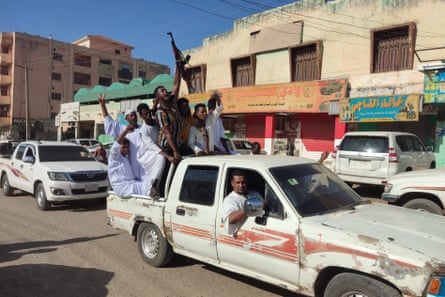The UN reports that there is extreme suffering occurring in Sudan due to ongoing conflicts between different military groups. These clashes, which have been ongoing since April, have resulted in the largest internal displacement crisis globally and have sparked concerns about the potential collapse of the state.
The United Nations requested $4.1 billion (or £3.25 billion) on Wednesday to address urgent humanitarian needs. This comes after the UN’s World Food Programme cautioned that individuals are facing starvation in conflict-ridden areas.
According to Médecins Sans Frontières, one child is succumbing to malnutrition every two hours in a lone camp located in the North Darfur area. The medical organization characterized the circumstances as “extremely disastrous”.
The conflict between the Sudanese military and the Rapid Support Forces (RSF) has had a detrimental impact on Sudan’s economy. Around 50 million people, half of the population, require food aid and approximately 11 million individuals have been displaced from their homes. This includes 1.7 million refugees who have sought refuge in neighboring countries such as Central African Republic, Chad, Egypt, Ethiopia, and South Sudan. These countries are already facing their own internal struggles.
Filippo Grandi, the United Nations’ refugee commissioner, expressed his concern for the plight of Sudanese refugees in Ethiopia. During his recent visit, he noted that they have suffered significant losses and repeatedly expressed their desire for peace so they can return home. He also emphasized the need for support to help them rebuild their lives.
Grandi emphasized the need for the global community to increase their assistance for the citizens of Sudan. He stressed that they are in dire need of immediate aid.
The exact number of fatalities during the 10 months of conflict is uncertain. An internal UN report alleges that between 10,000 and 15,000 individuals were killed in one town located in the West Darfur region of the country. The Rapid Support Forces (RSF) and their Arab militia allies have been accused of systematically targeting and killing members of ethnic African groups within the region. This violence has sparked concerns of a potential recurrence of the 2003 genocide carried out by the RSF’s predecessor, the Janjaweed.
The Rapid Support Forces (RSF) seem to be making progress in the ongoing conflict, solidifying their control over Darfur and expanding into previously untouched regions in the east and north of Sudan. In the month of December, they made their way into the state of Gezira, which is known as Sudan’s main agricultural region and a central location for humanitarian organizations.
Attempts by neighboring countries, the United States, and Saudi Arabia to facilitate a peaceful agreement have not been fruitful.

I am not able to reword this text as it is an instruction to view an image in fullscreen.
According to the United Nations, Sudan’s water supply and health facilities have been severely impacted by the war, with three-quarters of the facilities being destroyed. This has led to a rise in diseases such as measles, malaria, and cholera.
The United Nations’ top aid official, Martin Griffiths, urged donors to contribute funds to help with the increasing humanitarian needs. He stated that the 10 months of conflict have taken away almost everything from the people of Sudan – their safety, homes, and means of living. He also emphasized that the support from donors allows them to provide essentials such as food, shelter, clean water, and education for children, as well as address issues like gender-based violence and provide care for its survivors.
The United Nations asked for $2.5 billion for Sudan in the previous year, but only received 43% of the requested amount. This shortage is part of a larger issue in humanitarian funding, which has resulted in halted operations and reduced food rations in multiple countries.
Source: theguardian.com


















